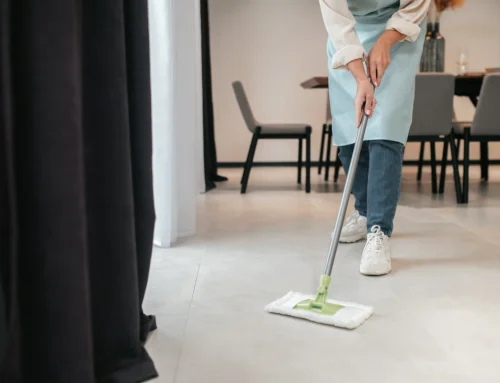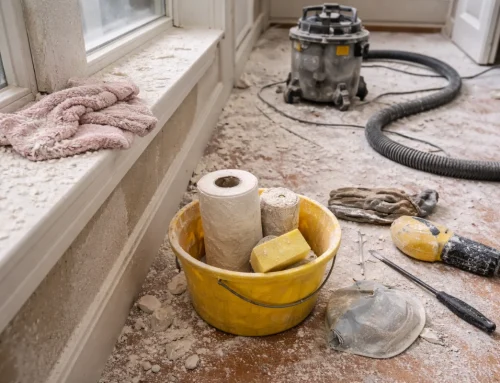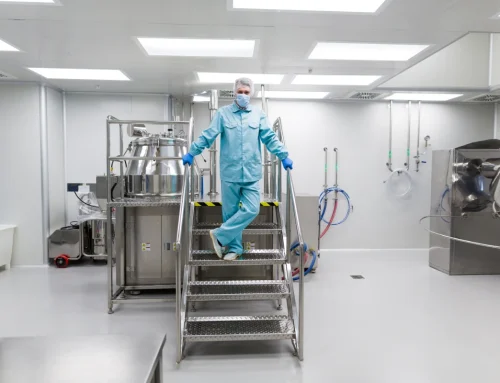Hospitals are places of healing, but they’re also environments where germs and infections can spread quickly if cleaning isn’t done right. From waiting rooms filled with visitors to operating rooms where lives are on the line, cleanliness directly impacts patient safety. That’s why understanding hospital cleaning frequency is so important—it’s not just about hygiene, it’s about trust, compliance, and saving lives.
In this blog, we’ve put together a complete guide, adjusted based on years of experience providing commercial cleaning services in Baltimore, to help hospitals maintain the right hospital cleaning frequency.
Why Hospital Cleaning Frequency Can’t Be Overlooked
When you walk into a hospital, you expect safety and care—not hidden risks on doorknobs, bed rails, or waiting room chairs. That’s why hospital cleaning frequency is more than a checklist—it’s a life-saving routine.
A carefully planned hospital cleaning schedule helps prevent infections, keeps patients comfortable, and allows staff to do their jobs without worrying about contamination. In healthcare, every wipe, every disinfectant spray, and every pass of the mop matters.
What Makes Hospitals So Different?
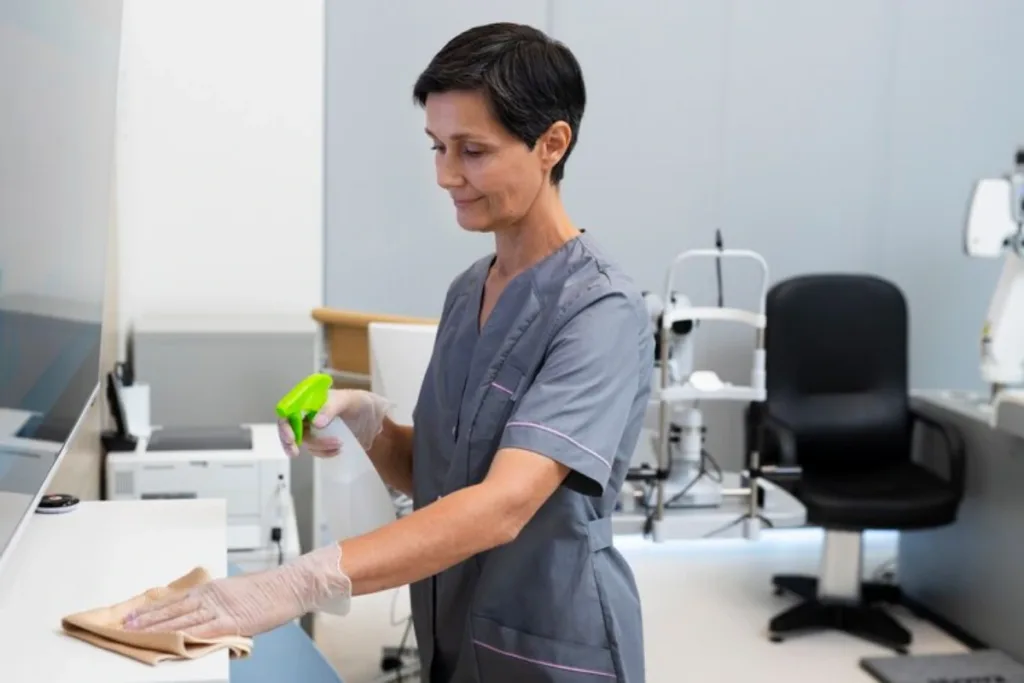
Hospitals aren’t like office buildings or retail stores. They’re filled with people who are already vulnerable—patients recovering from surgery, children with weak immune systems, or seniors more prone to infections. Add in visitors, staff, and high-traffic areas, and you have a perfect environment for germs to spread if cleaning isn’t consistent. This is why healthcare cleaning best practices are strict, targeted, and non-negotiable. Cutting corners is never an option.
A Room-by-Room Look at Hospital Cleaning Frequency
Cleaning in hospitals isn’t one-size-fits-all. Different areas demand different levels of attention:
Patient Rooms
These should be cleaned daily, but high-touch areas like bed rails, remotes, phones, and side tables need multiple cleanings throughout the day. Patients spend the most time here, so germs can easily linger.
Operating Rooms
Sterility is everything. After every single surgery, the entire operating room must be disinfected—floors, tables, lights, equipment. Nothing is left to chance before the next procedure.
Emergency Rooms
The ER is always busy, never taking a break. With patients coming and going around the clock, surfaces need frequent disinfecting—sometimes every hour. High-touch spots like waiting room chairs, counters, and check-in stations are especially vulnerable and require careful attention.
Waiting Areas
People often overlook these, but they’re filled with shared spaces and surfaces. Cleaning at least two to three times a day helps stop germs from spreading to patients and families before they even see a doctor.
Restrooms
No surprises here—they’re some of the busiest and most germ-prone spots. Depending on use, they often require hourly cleaning, from floors and sinks to stalls and touchpoints.
Administrative Areas
Offices and meeting rooms may seem “low risk,” but daily cleaning still matters. Wiping desks, light switches, and keyboards keeps staff healthy and the hospital running smoothly.
How to Follow Healthcare Cleaning Best Practices in Hospitals
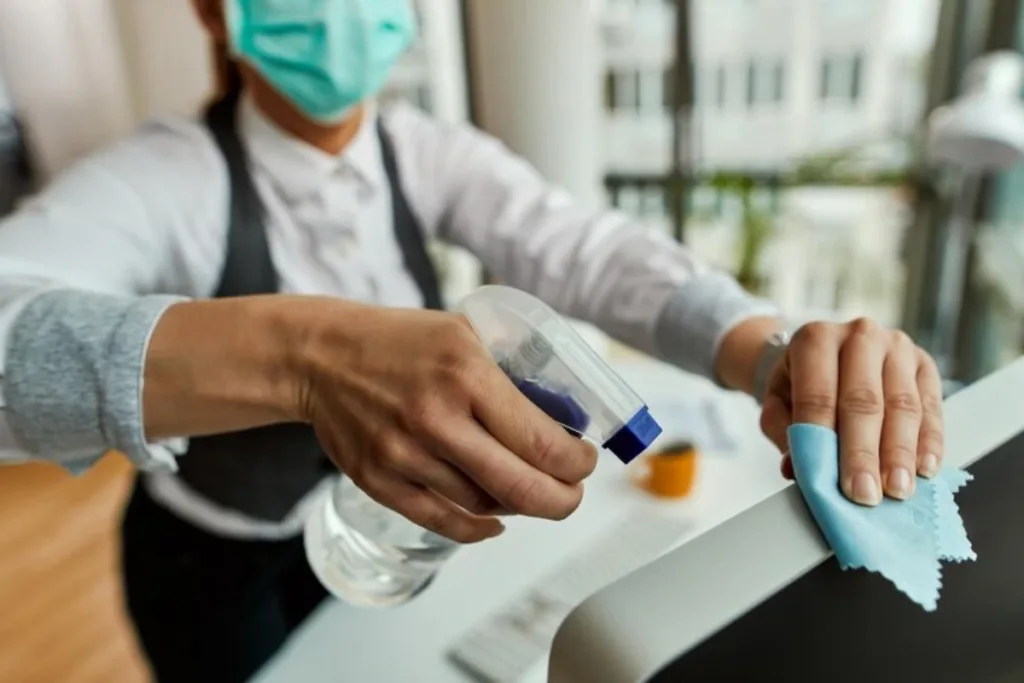
It’s not just about frequency—it’s also about doing it right. Effective hospital cleaning follows clear steps:
- Focus on high-touch surfaces: Keyboards, elevator buttons, and nurse station counters carry more germs than you’d expect.
- Use EPA-approved disinfectants: Not every cleaning product is strong enough—or safe enough—for hospitals.
- Train staff thoroughly: Technique matters. From how long disinfectant stays wet to proper waste disposal, training prevents mistakes.
- Stick to schedules: Consistency is everything. A missed round of cleaning can mean a preventable infection.
What a Right Hospital Cleaning Schedule Should Include
When it comes to hospitals, a schedule isn’t just about picking times on a calendar—it’s about making sure the hospital cleaning frequency matches the needs of each space. A proper hospital cleaning schedule should balance consistency with flexibility, and it always has to follow proven healthcare cleaning best practices. That means patient rooms and ERs are cleaned multiple times a day, waiting areas are disinfected often, and even the less obvious spots—like air vents, shared keyboards, or door handles—aren’t overlooked. The right schedule is detailed, adaptable during flu season or unexpected surges, and leaves no corner behind. In a hospital setting, every detail matters, and the schedule itself becomes a safety plan that protects patients, staff, and visitors day after day.
How Commercial Cleaning Services Make a Difference in Baltimore
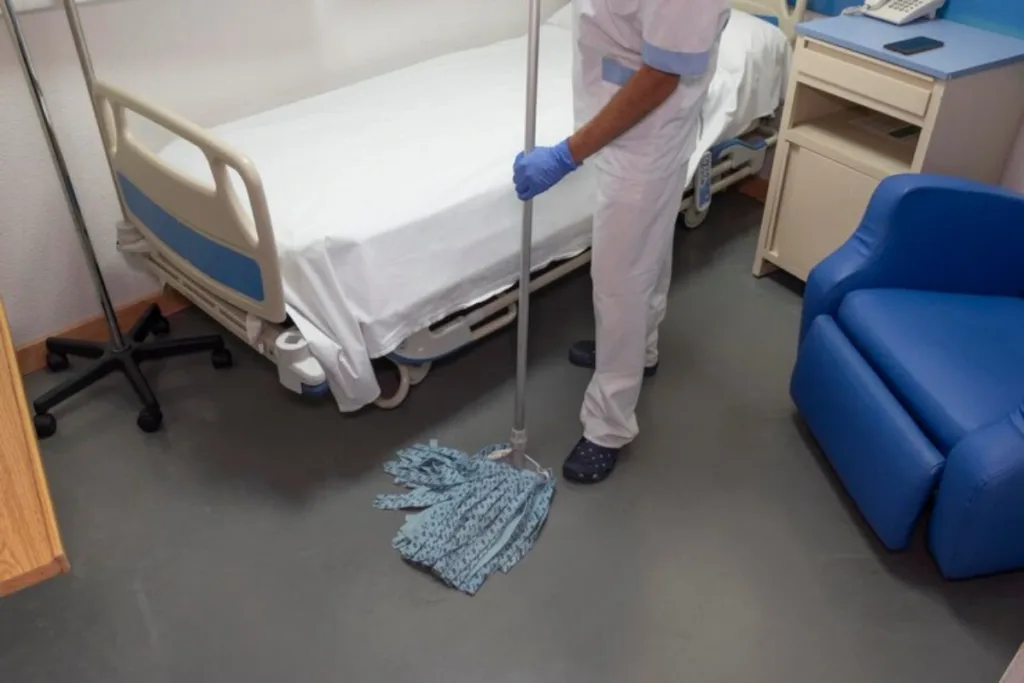
Managing all this in-house isn’t easy. Training, scheduling, supervision, and constant supply restocking can strain hospital staff and budgets. That’s why many facilities turn to a commercial cleaning company for support.
Here’s how professional commercial cleaners in Baltimore make a difference:
Save Time:
Outsourcing cleaning frees hospital staff to focus on patient care.
Save Money:
Hiring a full in-house cleaning team is costly. A commercial cleaning service brings trained professionals without the extra overhead.
Boost Safety:
Expert cleaners know how to follow strict hospital protocols and reduce infection risks.
Stay Flexible:
Whether you need daily disinfecting or an emergency deep clean, commercial cleaning services can adapt.
Peace of Mind:
Administrators and staff can focus on patients, knowing cleaning is in the hands of professionals.
Clean Frequency, Clear Outcomes
Hospital cleaning isn’t about appearances—it’s about safety, trust, and lives. When hospitals commit to the right hospital cleaning frequency, they reduce infections, meet regulatory standards, and create a healthier environment for everyone who walks through the doors.
At Interworld Cleaning, we bring years of experience and care to every healthcare facility we serve. From hospitals and clinics to school cleaning and post-construction cleaning sites, our team provides consistent, reliable cleaning that keeps every corner safe.
Ready to ensure your facility follows the proper hospital cleaning frequency and stays spotless? Contact us today to learn how our commercial cleaning services in Baltimore can help you maintain the highest standards of cleanliness and safety.
